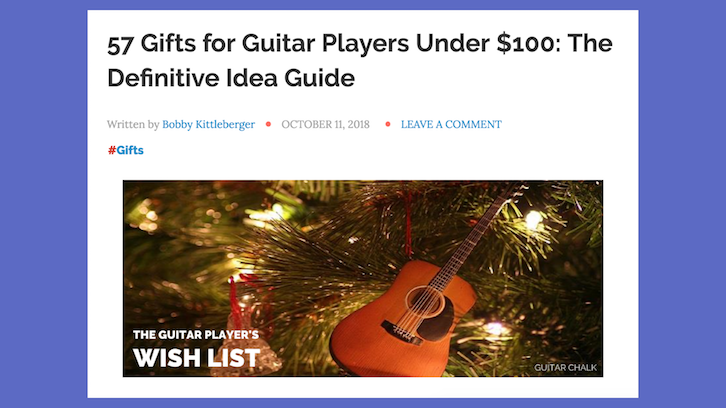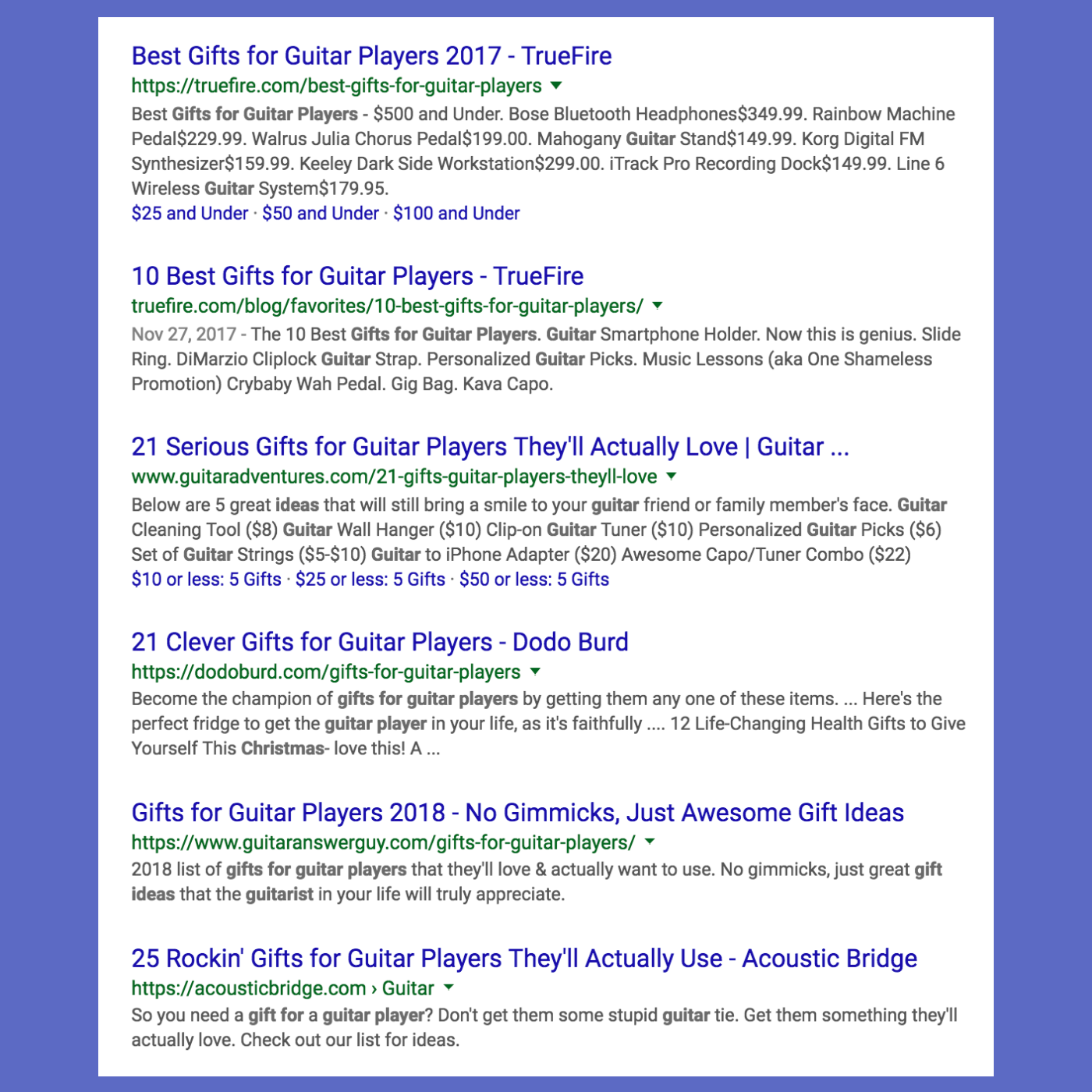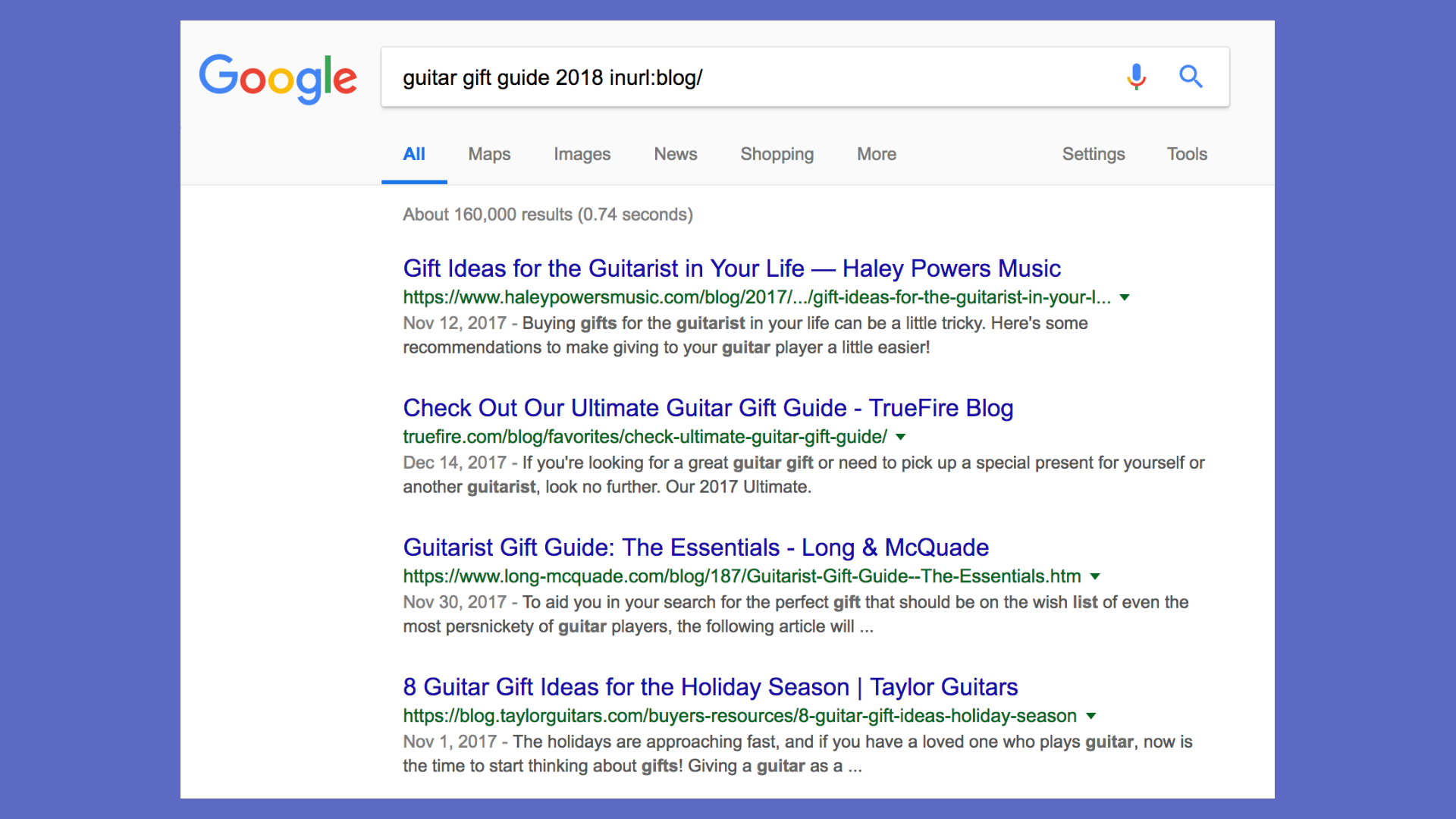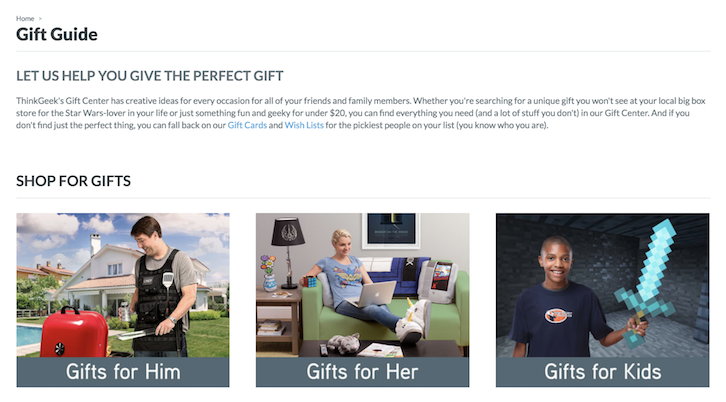How to Use Gift Guides to Boost Your Holiday Sales

As the holiday season approaches, store owners will begin scrambling to get the word out about their sales.
It’s important to get a good start. Many shoppers do a lot of research before big sale events and holidays. In fact, shoppers are researching Christmas gifts and gift ideas earlier than ever. According to the National Retail Federation:
- 40% of U.S. consumers begin researching their holiday shopping by the time November rolls around
- 18% are early bird shoppers who started in September or earlier
- 91% of consumers plan to celebrate the winter holidays this year
And Google searches for “gift guides” begin spiking in October, hitting their peak in December.
Display ads, email marketing, and retargeting are some of the most common methods to capture holiday shoppers. But there’s one overlooked strategy that has the potential to drive many customers to your store: gift guides.
Table of Contents
- The hidden potential of gift guides
- What gift guides look like
- How to find relevant gift guides
- The right way to request a mention
- Creating your own gift guide
- The gift of more sales
The hidden potential of gift guides
The NRF predicts consumers will spend a total of about $1,007.24 on gifts this holiday season. Holiday shoppers interested in gift ideas generally look to curated lists and guides for inspiration. There are likely websites in your niche that specialize in publishing gift guides featuring products in your category. There are also websites dedicated to creating gift guides across industries, like Gifts.com.
Most gift guides curate ideas for a loved one or friend, usually based on your relationship with them (e.g. gifts for Dad), around a shared interest (e.g. gifts for animal lovers), or for special occasions.
Gift guides usually offer a high return on investment for your time. If you’re featured, you’ll get in front of new, targeted shoppers with high intent to purchase, all for a few minutes spent writing a compelling pitch. Relatively unique or niche products do especially well in most gift guides.
What gift guides look like
If you’ve never come across a gift guide before, here’s an example from Guitar Chalk that caters to shoppers looking to buy for guitar players.

Featured in an online magazine for guitar players, this particular guide is one of the top search results for “gift ideas for guitar players 2018.” That keyword naturally draws shoppers interested in guitar-related products, and the high ranking ensures a steady flow of traffic, which is ideal for the publication and for the businesses featured.
Your outreach plan can consist of getting featured in existing guides like the above, or pitching publications likely to schedule a gift guide in their holiday editorial calendar. It’s a good sign when a publication has previously run gift guides, or if they usually publish product-related content during the holiday season.
How to find relevant gift guides
As you begin researching blogs and websites with gift guides in your niche, you’ll want to organize each into a spreadsheet (here’s a basic template). This will make the outreach process easier down the road.

Next, find the blogs and websites with gift guides in your niche. For example, if my store sells guitar straps, I would look for, and reach out to, blogs and websites with gift guides for guitar players.
Head over to Google and step into the shoes of someone researching gift ideas. What do you search? Here are some search terms and search ideas, just replace guitar with your store’s niche:
- guitar player gift guide
- guitar gift guide 2018
- guitar gift guide 2017 (offer suggestions to update for this year)
- guitar buying guide
- guitar buying guide 2018
- guitar buying guide 2017
- guitar player gift ideas
- guitar player christmas gift ideas
- guitar fathers day gift ideas
- guitar fathers day gift guide
- gift ideas for guitar lovers
Here’s what “guitar player Christmas gift ideas” turns up:

You can swap the year and holiday for whatever is most appropriate. For example, if you’re reading this in the far future, use 2050. If your products are well suited for Father’s Day, swap out Christmas for Father’s Day.
If you want to specifically find blogs with gift guides, add “inurl:blog.” to your query. Here are a few examples:
- guitar gift guide inurl:blog/
- guitar gift guide 2018 inurl:blog/
- gift ideas for guitar lovers inurl:blog/

Try a few variations of any keywords you identify, and add the most relevant and approachable websites to your spreadsheet. I recommend adding at least 20 possible websites before beginning the outreach process. Since you’ll likely get a number of results, you’ll want to curate them for quality. Here’s some criteria to help you out:
- Is the site approachable? If the gift guide appears on a competing store, they’re probably not too keen to feature you. If you come across a major publication, know that outreach will require more relationship-building with an editor before you can make a successful pitch.
- Does the site have an active readership? Check if the website is still active and that they have a reasonably sized audience. To do this, look at the date of their most recent post and see how many followers they have on social media. Check for other social proof like the average number of comments on their blog posts.
The typical tradeoff is the larger the available audience, the less accessible the editor/publication is—so you may want to opt for the niche websites and blogs with dedicated fans. The upside of being featured in a guide is potentially high, and the shelf-life of most guides means you’ll see results for a while, unless the site updates the guide or redirects it.
The right way to request a mention
First, you’ll need the contact information for the person who runs each website. For most blogs, this is as simple has heading to the footer or top navigation, usually labeled as “Contact” or “Contact Us.” If you can’t find it, try doing a search for “contact” on the homepage.
If you’re still struggling to find a website’s contact information, reach out to them on social media or use a tool such as Hunter.
Don’t send a mass email. This is an unprofessional, impersonal way to build business relationships, and mass emails are more likely to land in most recipients’ spam folders. Instead, send each person an individual, personalized email. Yes, it takes some extra work, but it’s worth it.
How do you personalize your pitch? Mention something you enjoyed from their gift guide, what you like about their blog, or how you found their site. Relate to the person within the first few lines of the email before getting into your request. If you give people the impression that you’ve sent the same email to a hundred other people, they won’t take your request seriously.
If you can afford to, offer to send them a sample of your product. People are more inclined to talk about or recommend a product after trying it for themselves. Here’s a sample script to help get you started:
Subject: I love your [post name] post
Message: Hey [name],
I read [post name] and loved it because [Y and Z]. Will you be updating it for [year] or writing a new one?
My name is [name] and I sell [product]. I’m putting together a sale for [holiday/sale event] and would love to be considered for your next list. I think [product] would make a great gift for [type of person using gift] because [X].
If you want to check it out yourself, I’d be happy to send you a sample. Here’s where you can learn more about it:
[my website url or product url]
Let me know what you think and if you’re interested!
Looking forward to your response,
- [name and contact]
Don’t be afraid to follow up a week later if you don’t hear back. I’ve found I get far more responses when I follow up at least once.
You should also set realistic expectations. If you email 20 different websites, expect around only a handful of interested responses. Not everyone has plans to create or update their gift guides and not everyone will be interested in your product or think it’s a good fit for their audience. Don’t take it personally, you only need to have your product in one gift guide to see a significant increase in sales.
Creating your own gift guide
Another option you have is to create your own gift guide on your website and promote your own products within them. This typically a better fit for stores that have built at least few links or mentions, and for store owners that know the basics of SEO.
To continue with our example, take a look at the searches for “gifts for guitar players” according to Moz’s Keyword Explorer.

In this example, there’s definitely an opportunity to create a gift guide page to drive organic traffic from interested searchers. Other brands and stores have done this as well for their own products. Just take a look at ThinkGeek’s gift guide page.

What should you include on your gift guide page? Write a short blurb at the top of the page, around 100 words, introducing and talking about what gifts you’re curating and who the list is perfect for.
You should also title your page appropriately. In this case, since we want to try and rank for “gifts for guitar players,” we might consider naming the page “Gift Ideas for Guitar Players.”
Next, we’ll need collections (or groups) of the items to include in the gift guide. We could simply create one collection and call it “gift guide” or create a collection to further categorize the gifts such as “gifts for him” or “gifts under $20.”
If you want to learn more about how to create collections using Shopify, check out the Shopify manual. Remember to include a link to each collection on the gift guide page.
Alternatively, you can publish your gift guide as a blog post instead of a separate page. For example, “best 2018 christmas gifts for guitar players” could be a helpful post to publish. You could also consider publishing a series of blog posts covering gift ideas for different occasions and different kinds of guitar players.
The gift of more sales
While pitching gift guides takes just a bit of time and effort, the potential payoff can help catapult your holiday sales. Those searching for and looking at gift guides are high-intent shoppers—they’re primed and ready to buy, they just need help determining what that purchase should be. With just a few strategic pitches and a quality gift guide post of your own, you can put your brand and products in front of holiday spenders.
More advice on driving sales this holiday season:
- Get Your Store Ready for the Holidays: Apps, Ideas, and Examples
- How to Survive the Holiday Customer Service Rush
- How to Turn Seasonal Shoppers Into Lifelong Customers